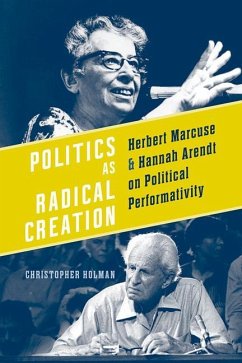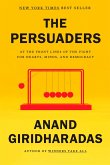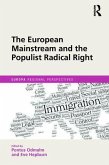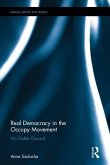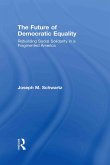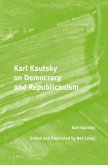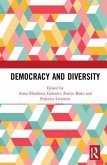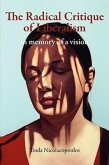Christopher Holman
Politics as Radical Creation
Herbert Marcuse and Hannah Arendt on Political Performativity
Christopher Holman
Politics as Radical Creation
Herbert Marcuse and Hannah Arendt on Political Performativity
- Gebundenes Buch
- Merkliste
- Auf die Merkliste
- Bewerten Bewerten
- Teilen
- Produkt teilen
- Produkterinnerung
- Produkterinnerung
Politics as Radical Creation examines the meaning of democratic practice through the critical social theory of the Frankfurt School.
Andere Kunden interessierten sich auch für
![The Persuaders The Persuaders]() Anand GiridharadasThe Persuaders24,99 €
Anand GiridharadasThe Persuaders24,99 €![The European Mainstream and the Populist Radical Right The European Mainstream and the Populist Radical Right]() The European Mainstream and the Populist Radical Right214,99 €
The European Mainstream and the Populist Radical Right214,99 €![Real Democracy Occupy Real Democracy Occupy]() Anna SzoluchaReal Democracy Occupy146,99 €
Anna SzoluchaReal Democracy Occupy146,99 €![The Future of Democratic Equality The Future of Democratic Equality]() Joseph M SchwartzThe Future of Democratic Equality270,99 €
Joseph M SchwartzThe Future of Democratic Equality270,99 €![Karl Kautsky on Democracy and Republicanism Karl Kautsky on Democracy and Republicanism]() Karl KautskyKarl Kautsky on Democracy and Republicanism209,99 €
Karl KautskyKarl Kautsky on Democracy and Republicanism209,99 €![Democracy and Diversity Democracy and Diversity]() Democracy and Diversity203,99 €
Democracy and Diversity203,99 €![The Radical Critique of Liberalism The Radical Critique of Liberalism]() Toula NicolacopoulosThe Radical Critique of Liberalism36,99 €
Toula NicolacopoulosThe Radical Critique of Liberalism36,99 €-
-
-
Politics as Radical Creation examines the meaning of democratic practice through the critical social theory of the Frankfurt School.
Hinweis: Dieser Artikel kann nur an eine deutsche Lieferadresse ausgeliefert werden.
Hinweis: Dieser Artikel kann nur an eine deutsche Lieferadresse ausgeliefert werden.
Produktdetails
- Produktdetails
- Verlag: University of Toronto Press
- Seitenzahl: 272
- Erscheinungstermin: 28. August 2013
- Englisch
- Abmessung: 231mm x 155mm x 25mm
- Gewicht: 567g
- ISBN-13: 9781442644885
- ISBN-10: 1442644885
- Artikelnr.: 38150161
- Herstellerkennzeichnung
- Libri GmbH
- Europaallee 1
- 36244 Bad Hersfeld
- gpsr@libri.de
- Verlag: University of Toronto Press
- Seitenzahl: 272
- Erscheinungstermin: 28. August 2013
- Englisch
- Abmessung: 231mm x 155mm x 25mm
- Gewicht: 567g
- ISBN-13: 9781442644885
- ISBN-10: 1442644885
- Artikelnr.: 38150161
- Herstellerkennzeichnung
- Libri GmbH
- Europaallee 1
- 36244 Bad Hersfeld
- gpsr@libri.de
Christopher Holman
Introduction: Marcuse, Arendt, and the Idea of Politics
Chapter One: Marcuse’s Critique and Reformulation of the Philosophical
Concept of Essence
1. Culture and Bourgeois Freedom
2. Critical Theory and the Ethical Imperative: Happiness-Reason-Freedom
3. Hegel and the Dialectic of Negativity
4. Essence and the Dialectic of Labour
Chapter Two: The Dialectic of Instinctual Liberation: Essence and
Non-Repressive Sublimation
5. The Problem of Repression: Individual and Social, Basic and Surplus
6. The Affirmation of Sensuousness: Primary Narcissism and Non-Repressive
Sublimation
7. Non-Repressive Sublimation and Non-Alienated Labour
Chapter Three: The Problem of Politics
8. Marx’s Political Ambiguity
9. The Limits of Western Marxism
10. Marcuse’s Reproduction of the Marxian Anti-Politics
11. Administration as Domination and Liberation
Chapter Four: Hannah Arendt’s Theory of Public Freedom
12. Performativity and Essence: The Need for Radical Creation
13. The Subject of Radical Creation: Politics and the We
14. Agonism, Democracy, and Political Objectification
15. Arendt and Revolutionary History
16. The Institutionalization of the Revolutionary Impulse: The Council
Tradition
Chapter Five: Marcuse Contra Arendt: Dialectics, Destiny, Distinction
17. Questioning Distinction: the Vita Activa and Marx’s Ontology of Labour
18. Arendt’s Critique of the Dialectic: On the Need for Distinction
19. Marcuse’s Critique of Non-Dialectical Dialectics
Chapter Six: Marcuse: Reconsidering the Political
20. The Theory of the Radical Act
21. The Affirmation of Socialist Nature
22. Politics and the New Left
23. Spontaneity and the Council Tradition
Conclusion: From the New Left to Global Justice and from the Councils to
Cochabamba
Works Cited
Chapter One: Marcuse’s Critique and Reformulation of the Philosophical
Concept of Essence
1. Culture and Bourgeois Freedom
2. Critical Theory and the Ethical Imperative: Happiness-Reason-Freedom
3. Hegel and the Dialectic of Negativity
4. Essence and the Dialectic of Labour
Chapter Two: The Dialectic of Instinctual Liberation: Essence and
Non-Repressive Sublimation
5. The Problem of Repression: Individual and Social, Basic and Surplus
6. The Affirmation of Sensuousness: Primary Narcissism and Non-Repressive
Sublimation
7. Non-Repressive Sublimation and Non-Alienated Labour
Chapter Three: The Problem of Politics
8. Marx’s Political Ambiguity
9. The Limits of Western Marxism
10. Marcuse’s Reproduction of the Marxian Anti-Politics
11. Administration as Domination and Liberation
Chapter Four: Hannah Arendt’s Theory of Public Freedom
12. Performativity and Essence: The Need for Radical Creation
13. The Subject of Radical Creation: Politics and the We
14. Agonism, Democracy, and Political Objectification
15. Arendt and Revolutionary History
16. The Institutionalization of the Revolutionary Impulse: The Council
Tradition
Chapter Five: Marcuse Contra Arendt: Dialectics, Destiny, Distinction
17. Questioning Distinction: the Vita Activa and Marx’s Ontology of Labour
18. Arendt’s Critique of the Dialectic: On the Need for Distinction
19. Marcuse’s Critique of Non-Dialectical Dialectics
Chapter Six: Marcuse: Reconsidering the Political
20. The Theory of the Radical Act
21. The Affirmation of Socialist Nature
22. Politics and the New Left
23. Spontaneity and the Council Tradition
Conclusion: From the New Left to Global Justice and from the Councils to
Cochabamba
Works Cited
Introduction: Marcuse, Arendt, and the Idea of Politics
Chapter One: Marcuse’s Critique and Reformulation of the Philosophical
Concept of Essence
1. Culture and Bourgeois Freedom
2. Critical Theory and the Ethical Imperative: Happiness-Reason-Freedom
3. Hegel and the Dialectic of Negativity
4. Essence and the Dialectic of Labour
Chapter Two: The Dialectic of Instinctual Liberation: Essence and
Non-Repressive Sublimation
5. The Problem of Repression: Individual and Social, Basic and Surplus
6. The Affirmation of Sensuousness: Primary Narcissism and Non-Repressive
Sublimation
7. Non-Repressive Sublimation and Non-Alienated Labour
Chapter Three: The Problem of Politics
8. Marx’s Political Ambiguity
9. The Limits of Western Marxism
10. Marcuse’s Reproduction of the Marxian Anti-Politics
11. Administration as Domination and Liberation
Chapter Four: Hannah Arendt’s Theory of Public Freedom
12. Performativity and Essence: The Need for Radical Creation
13. The Subject of Radical Creation: Politics and the We
14. Agonism, Democracy, and Political Objectification
15. Arendt and Revolutionary History
16. The Institutionalization of the Revolutionary Impulse: The Council
Tradition
Chapter Five: Marcuse Contra Arendt: Dialectics, Destiny, Distinction
17. Questioning Distinction: the Vita Activa and Marx’s Ontology of Labour
18. Arendt’s Critique of the Dialectic: On the Need for Distinction
19. Marcuse’s Critique of Non-Dialectical Dialectics
Chapter Six: Marcuse: Reconsidering the Political
20. The Theory of the Radical Act
21. The Affirmation of Socialist Nature
22. Politics and the New Left
23. Spontaneity and the Council Tradition
Conclusion: From the New Left to Global Justice and from the Councils to
Cochabamba
Works Cited
Chapter One: Marcuse’s Critique and Reformulation of the Philosophical
Concept of Essence
1. Culture and Bourgeois Freedom
2. Critical Theory and the Ethical Imperative: Happiness-Reason-Freedom
3. Hegel and the Dialectic of Negativity
4. Essence and the Dialectic of Labour
Chapter Two: The Dialectic of Instinctual Liberation: Essence and
Non-Repressive Sublimation
5. The Problem of Repression: Individual and Social, Basic and Surplus
6. The Affirmation of Sensuousness: Primary Narcissism and Non-Repressive
Sublimation
7. Non-Repressive Sublimation and Non-Alienated Labour
Chapter Three: The Problem of Politics
8. Marx’s Political Ambiguity
9. The Limits of Western Marxism
10. Marcuse’s Reproduction of the Marxian Anti-Politics
11. Administration as Domination and Liberation
Chapter Four: Hannah Arendt’s Theory of Public Freedom
12. Performativity and Essence: The Need for Radical Creation
13. The Subject of Radical Creation: Politics and the We
14. Agonism, Democracy, and Political Objectification
15. Arendt and Revolutionary History
16. The Institutionalization of the Revolutionary Impulse: The Council
Tradition
Chapter Five: Marcuse Contra Arendt: Dialectics, Destiny, Distinction
17. Questioning Distinction: the Vita Activa and Marx’s Ontology of Labour
18. Arendt’s Critique of the Dialectic: On the Need for Distinction
19. Marcuse’s Critique of Non-Dialectical Dialectics
Chapter Six: Marcuse: Reconsidering the Political
20. The Theory of the Radical Act
21. The Affirmation of Socialist Nature
22. Politics and the New Left
23. Spontaneity and the Council Tradition
Conclusion: From the New Left to Global Justice and from the Councils to
Cochabamba
Works Cited

